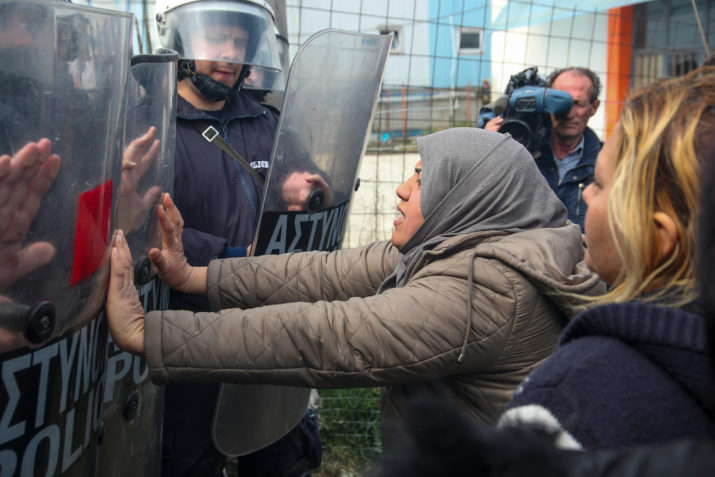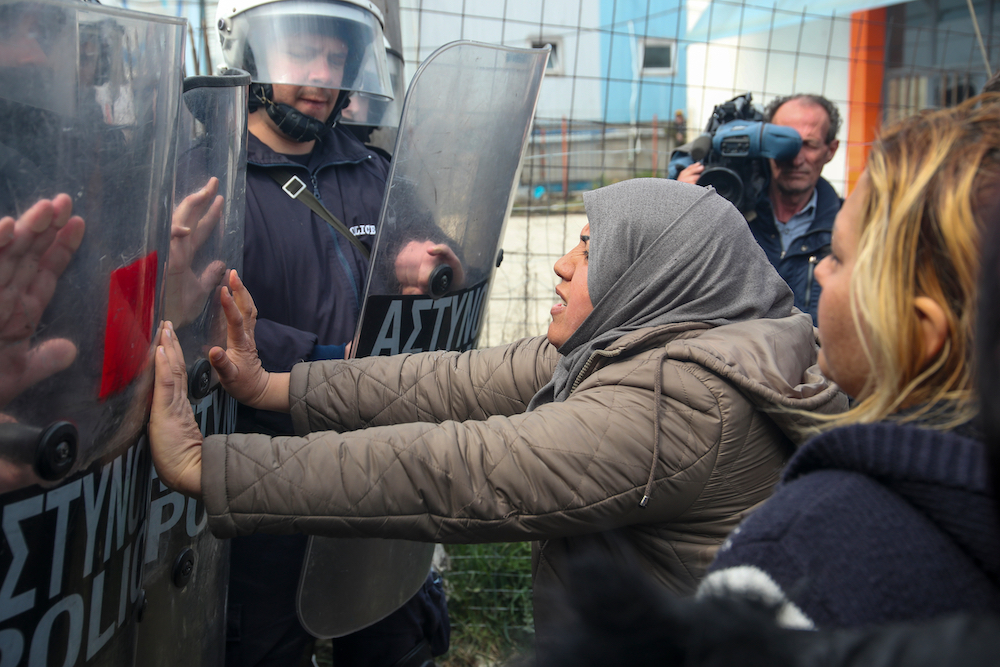

This is part of our special feature, Securitization of Identity.
Research on the Greek migration experience has shown that new concepts are necessary in order to describe both the weaknesses of the current response mechanisms and the need to identify and formulate more specific solutions to the problems induced by massive migration and refugee flows since 2015. Flexicuritization is such a concept. It has been introduced by Dimari (2021) and it is described as a flexible construct of security, tackling both state security-centered concerns, as well as refugee/migrants’ security and livelihood, being thus situated in a context of state with human security compromise.
Even though this strategy fits to serve short term concerns, such as the refugee crisis in Greece—with nevertheless more long-term implications—it needs considerable elaboration to address a fundamental issue. The need to build upon a “flexicuritization” strategy for the long term—that is, to tackle the securitization of migration as a well routed phenomenon in the Greek case, thus creating the necessity to study the political culture of Greece and its relation to security patterns. This concern sets out from current and past research that shows that the Greek cultural heritage is a major driver for the successful securitization of migration and is related to societal concerns and especially identity (Bossis and Lampas 2018; Praskeva-Gizi 2017; Triantafyllidou 1998), suggesting that any attempt to formulate a desecuritization strategy will be doomed to fail, unless political culture is taken into consideration.
Theoretical insights
A Taxonomy of Desecuritization Strategies
Desecuritization has been perceived differently by respective scholars in the field. For Balzacq (2014, 85), “desecuritization is the opposite of securitization,” whereas, for Buzan et al (1998) desecuritization marks the restoration of routine politics. Following the Copenhagen School’s statement that “desecuritization should be the optimal long-range option” (Buzan et al. 1998, 29), this concept has since been examined in the light of a variety of approaches. As far as desecuritization strategies are concerned, Ole Waever (2006) was the first to suggest a range of them which the authors of this paper refer to as the “first generation strategies:” the non-existence of a dialectic on an issue as a threat, the management of a securitized policy so that it is not spiral and the movement of the securitized issue back to the normal sphere of policy.
At a later stage, there emerged a body of literature pertaining to desecuritization strategies, inspired by the ones formulated by Ole Waever (2006), which points out to the return to normal politics and which we refer to as the “second generation strategies.” The approaches that focus on the position that desecuritization is the restoration of normal politics can be grouped into four categories: deconstructivism (Huysmans 1998), emancipation (Aradau 2004), reconstructivism (Jutila 2006) and the management (Roe 2004). The first two regard migration, whereas the second set regards ethnic minorities.
More specifically, Huysmans (1998) after having proposed an objectivist, a constructivist, and a deconstructivist strategy, chose the latter as the most proper due to the fact that it aims to re-shift migration as a political issue to a normative sphere of handling, casting out the existential threat factor. Aradau (2004), from the other side, goes for an emancipation type of unmaking security, which is influenced by the principles of universality and recognition. Roe (2004) views the management or the moderate securitization of ethnic minorities, arguing that the possibility for a functional desecuritization is limited, whereas Jutila (2006) proposes a reconstructivist strategy which is based on the dialectic of the identity and political communities.
Hansen (2012) identifies four forms of desecuritization, which we put in the box of the “third generation strategies.” The first regards the change that comes as a process of stabilization. In this form the implicated parts recognize each other as legitimate parties and decide to distance themselves from the logic of securitization. The second form is replacement, whereby a securitized issue is replaced by a new securitized one, signifying the former’s desecuritization. The third form is rearticulation which consists of a total redefinition and as such transformation both of the identity as well as the pursuits of the implicated parts involved. Last, is silencing whereby the cease of the political discourse on the security threat that would take place, is the fourth form proposed by Hansen (2012).
Perhaps the most coherent desecuritization strategy repertoire, or, in our words, the “fourth generation strategies” are presented in the book Contesting security: Strategies and Logics, which was edited by Thierry Balzacq in 2014. In this collective effort, the ways to contest security are divided into four main categories. Each one of them entails a number of strategies that add up to the field of security contestation. These are: resistance, which is “captured by the binary opposition between rulers and ruled, those who dominate and those who resist” (Balzack 2014, 11), and which is generally perceived as a counter-politics directed towards an oppressive regime or dialectic. Out of this category the counter-securitization strategy was later on articulated by Ian Paterson and George Karyotis in 2020, which could be referred to as securitization of securitization strategy. The second one is desecuritization, which is presented as a major strategy contesting security and pertains to the usage of a “grammar that underwrites the enactment of practice clear of the security-defense rationale” (McDonald 2012 in Balzacq 2014, 86). The third one is emancipation, which now takes another impetus encompassing the notion that “emancipation does not aim to preserve an existing or past policy; it works toward a new state of affairs” (Balzack 2014, 139), whereas the last broad strategy articulated is resistance which draws from material sciences and clinical psychology and refers to “strategies that can be deployed in order to enable subjects to overcome adversity and allow the society to continue to operate without or with little disturbance” (Balzack 2014, 170). In other words, it refers to the ability of a society to bounce back from and to absorb shocks.
Drawing from the necessity to formulate a strategy that would leave the realm of theory and would extent to a tangible and implementable desecuritization strategy, flexicuritization came as a response to two important issues: the first concerns the excess refugee crisis of 2015 that severely hit Greece as a frontline country and brought to the forefront the structural deficiencies and discontinuities of the Greek migration policy (Papadakis et al. 2021). The second concerns the realization that despite the fact that a desecuritization approach was much needed in the Greek case, it was nevertheless absent. Nowhere in the international literature could a tangible strategy be found. As such flexicuritization was meant to fill this gap, taking as an example the Greek case, in which a large number of migrants have arrived since 2015 mainly due to the Syrian war and there was a vast securitization trend among crucial policy actors, such as the government and several political parties.
Flexicuritization (which is included in the fifth generation of desecuritization strategies) is defined as “the shift of a securitized issue away from a security-centered constructed political agenda” (Dimari, 2021, 3). Yet, what is crucial about it, is that other than it stems out of normative considerations, it is more of a processual strategy which aspires to bridge the gap between human and state security for the benefit of migrants and refugees, the national interests of a state and the host society. Thus, we are actually referring to a situation in which, for example, the government, the main political parties or the media do not treat migrants and refugees as the solid sources of illegal activities, therefore creating a public sense of fear towards them. Flexicuritization is inspired by Roe’s (2004) desecuritization strategy on ethnic minorities which calls for a moderate desecuritization and it is based upon the premises of management. This flexible construct, cannot neglect the fact that security is a “substantive right of all people” (Dimari 2021, 3), and as such, to cast aside even one side involved in the overall frame would automatically signify the failure of any desecuritization strategy from its onset. Hence, this strategy entails fifteen actions (Dimari 2021, 10-11), which begin from the borders and extent inwards, through the use of positive forms of supervision and monitoring. In their essence, these actions have been constructed to serve pragmatic concerns of both the state and migrants/refugees, relying upon a utilitarian approach that is directed towards the host society, that is Greece, and taking into consideration the formulation of a pragmatic strategy that would serve short, mid and long term considerations of all parts implicated. As such they draw insights from the schools of realism, liberalism, and constructivism.
Rationale of Study: a Political Culture Approach
In 2015, the Greek island of Lesvos became the focus of international attention due to the vast refugees’ flows that reached its shores. According to international surveys, in the year 2015, more than one million migrants/refugees crossed the Greek territories in order to find better living conditions, out of which, the overwhelming majority used the town of Mytilene, Lesvos, as its entry point (Kotroyannos et al. 2020). At the end of August 2020, the Moria hotspot and the adjacent informal Olive Grove area were home to about 12,000 asylum seekers, including about 4,000 children (UNHCR 2020). The response of Greek government officials and more importantly of local political elite actors in the island, suggests that migrants as well as refugees have been securitized (Kotroyannos et al. 2020).
Yet, the securitization of migration in Greece is not a new phenomenon. Rather, it is an evolving process taking place ever since the 1990s when Greece switched from a sending country to a receiving one (Karyotis 2012). This ongoing securitization process raises the question of whether particular political processes within the political and civic culture abet successful securitization processes (Kalu 2018). In other words, can the political culture of Greece be a driver of a successful securitization of migration? And if so, how can political culture open the door to specific political preferences or twist political outcomes as far as migration is concerned (Kalu 2018)? A combination of these questions leads to the central research question of this research, which is: Does the political culture of Greece underwrite its security makings and if so, does it imply their unmaking?
The departing point for the afore mentioned questions has been a research conducted by the Centre for Human Rights (KEADIK) of the Department of Political Science of the University of Crete in 2018, entitled “Identification and categorization of refugees in the Greek productive system with case studies the regions of Crete and Mytilene (MIS 5006494),” co-funded by the European Social Fund and national funds . Its findings strongly support that the political culture of securitization of the migrants and refugees in the island of Lesvos, is deeply embedded in societal security concerns, which are inextricably linked with fears of otherness in a Schmitian logic (Kotroyannos et al. 2020).
The Greek political culture has played a significant role in security understandings concerning migration, especially following the refugee crisis of 2015. We support though that cultural practices precipitated the refugee crisis of 2015 and that they continue to play powerful roles in Greek politics today, where they are essential to grasping the realization of a successful securitization of migration in Greece. Overall, and in the words of Oren (2000), culture and power are viewed as constituting a “nexus” in the Greek case of securitization of migration, pointing out that any attempt to desecuritize, should take into serious consideration political culture aspects.
Indeed, Greece is one of the most homogeneous European countries, where religion plays an important role at societal level. Thus, illegal migration, as well as refugees and asylum seekers from Muslim countries, are often seen and framed by politicians as a threat to national homogeneity and Greek national identity (Praskeva-Gizi 2017; Bossis and Lampas 2018).
The evolving nature of this phenomenon, which emerged in the 1990s (Karyotis 2012), faded down in the 2000s (Swarts and Karakatsanis 2013) and re-surfaced from 2011 to 2020 (Dimari 2021; Lazaridis and Skleparis 2016; Grogoriadis and Dilek 2019; Stivas 2021), suggests that there is an underlying factor, in other words, a driver or facilitator of successful securitization of migration in the case of Greece. Specifically, societal concerns pertaining to the dichotomy of “us” vs the “other” in Greece, are linked with the fear of otherness, in a Schmitian logic, prompting, as such, the question of whether the political culture of Greece favors such dichotomies, thus providing fertile ground for the successful securitization of migration and as such, of its desecuritization.
Our main purpose was to take the flexicuritization of migration strategy a step further, by drawing insights from a political culture standpoint. From a theoretical perspective, the extant desecuritization framework was taken as a starting point; a step which led to a new taxonomy of desecuritization strategies and to the inclusion of flexicuritization in the fifth generation of desecuritization strategies.
The article then provided the rationale behind the decision to conduct this research. More in particular, the authors of this study, having been inspired by the findings of a prior research (Kotroyannos et al. 2020), decided to use its findings and conduct a new one that would aim to answer a new research question, namely, whether the political culture of Greece is related to its securitization of migration processes thus implying that the strategy of flexicuritization should be further addressed encompassing political culture components that should be scientifically investigated to be embedded in the renewed strategy.
What comes out from the analysis of the results is that the political culture of Greece has been a main driver in securitization of migration processes in Greece, and as such it is considered a crucial factor to take into consideration in the advancement of the flexicuritization strategy. More specifically, societal concerns that are embedded in the fear of cultural erosion from Muslim populations seem to contribute in the political attempt to establish a successful security apparatus in Greece in relation to migration thus suggesting that the incorporation of these findings in the renewed flexicuritization strategy is necessary.
At a deeper level, it seems that recurring similarities in Greek history, pertaining to migration, can be seen as a product and as a reflection of relatively enduring aspects of the political culture and the history of Greece, overall. Despite the fact that each generation transforms its past, it nevertheless maintains a part of this past, while at the same time adding to it. As such, political context and culture, constitute the foundation upon which political elite actors build their securitization cases. In Triantafyllidou’s (1998, 606), words, “efforts to securitize migration are thus intertwined with historical Greek self-perceptions and national myths but also with stereotypes, especially in relation to Islam.”
These findings have great implications in the sense that they add greatly in the past and current ergography on (de)securitization. In addition, they pave the way to study both securitization and desecuritization under the spectrum of political culture, something that up to this point, has not been realized. Last and most importantly, the fact that the political culture of Greece underwrites its security makings also implies its study for the unmaking or contesting of its security practices.
Georgia Dimari is an Adjunct Lecturer at the Department of Political Science of the University of Crete, Greece, and researcher of the Centre for Political Research and Documentation of the University of Crete (KEPET).
Stylianos Ioannis Tzagkarakis is a Teaching Fellow at the Department of Political Science of the University of Crete, Field Manager of the Centre for Political Research and Documentation of the University of Crete (KEPET), and General Secretary of the Hellenic Association of Political Scientists (HAPSc).
References
Aradau, Claudia. 2004. “Security and the democratic scene: Desecuritization and emancipation”. Journal of International Relations and Development, 7, no. 4: 388-413.
Balzacq, Thierry (Ed.). 2014. Contesting security: Strategies and logics. London: Routledge.
Bossis, Mary and Nikolaos Lampas. 2018. “Is Refugee Radicalization a Threat to Greece?” Mediterranean Quarterly, 29, no. 1: 36-47.
Buzan, Barry, Wæver, Ole, and Jaap De Wilde. 1998. Security: A new framework for analysis. Lynne Rienner Publishers.
Dimari, Georgia. 2021. “Desecuritizing migration in Greece: Contesting securitization through “flexicuritization””. International Migration.
Grigoriadis, Ioannis N. and Dilek, Esra. 2018. “Securitizing migration in the European Union: Greece and the Evros fence”. Journal of Balkan and Near Eastern Studies, 21, no. 2: 170-186.
Hansen, Lene. 2012. “Reconstructing desecuritisation: the normative-political in the Copenhagen School and directions for how to apply it”. Review of international studies, 38, no. 3: 525-546.
Jutila, Matti. 2006. “Desecuritizing minority rights: Against determinism”. Security dialogue, 37, no. 2: 167-185.
Kalu, Kalu N. 2018. Political Culture, Change, and Security Policy in Nigeria. London: Routledge.
Karyotis, Georgios. 2012. “Securitization of migration in Greece: process, motives, and implications”. International Political Sociology, 6, no. 4: 390-408.
Kotroyannos, Dimitrios, Tzagkarakis, Stylianos I., Kamekis, Apostolos, Dimari, Georgia and Emmanouil Mavrozacharakis. 2020. Dimensions and Prospects for the Integration of Refugees in the Greek Social and Economic System: Findings from the Case Study in Lesvos and Crete. Athens: Sideris.
Lazaridis, Gabriella and Dimitris Skleparis. 2016. “Securitization of migration and the far right: the case of Greek security professionals”. International Migration, 54, no. 2: 176-192.
Oren, Ido. 2000 “Is Culture Independent of National Security? How America’s National Security Concerns Shaped Political Culture’ Research”. European Journal of International Relations, 6, no. 4: 543-573.
Papadakis, Nikos. 2021. “Cultural Diversity in the EU: theoretical insights and critical notes on the EU migration policy, in the context of the refugee crisis”. In The role of Intercultural Dialogue in managing diversity in Europe. Conference Proceedings, edited by Dimitra Anagnostopoulou. Springer Publishers.
Paraskeva-Gkizi Elisavet. 2017. Asylum seekers and refugees in Greece: Can we talk about integration? CEMMIS. Available at: http://www.cemmis.edu.gr/index.php/item/537-asylum-seekers-and-refugees-in-greece-can-we-talk-about-integration.
Paterson, Ian and Georgios Karyotis. 2020. “‘We are, by nature, a tolerant people’: Securitisation and counter-securitisation in UK migration politics”. International Relations, 0047117820967049.
Roe, Paul. 2004.“Securitization and minority rights: Conditions of desecuritization”. Security dialogue, 35, no. 3: 279-294.
Stivas, Dionysios. 2021. “Greece’s response to the European refugee crisis: A tale of two securitizations”. Mediterranean Politics: 1-24.
Swarts, Jonathan and Neovi M Karakatsanis. 2013. “Challenges to desecuritizing migration in Greece”. Journal of Balkan and Near Eastern Studies, 15, no. 1: 97-120.
Triandafyllidou, Anna. 1998. “National identity and the ‘other’”. Ethnic and racial studies, 21, no. 4: 593-612.
UNHCR. Operational Portal. Refugee Situations. Greece, 2020. Available at: https://data2.unhcr.org/en/situations/mediterranean/location/5179.
Wæver, Ole. 2006. “The EU as a security actor: Reflections from a pessimistic constructivist on post-sovereign security orders”. In International relations theory and the politics of European integration, edited by Kelstrup, Morten and Williams Michael, 250-294. London: Routledge.
Published on April 18, 2022.




